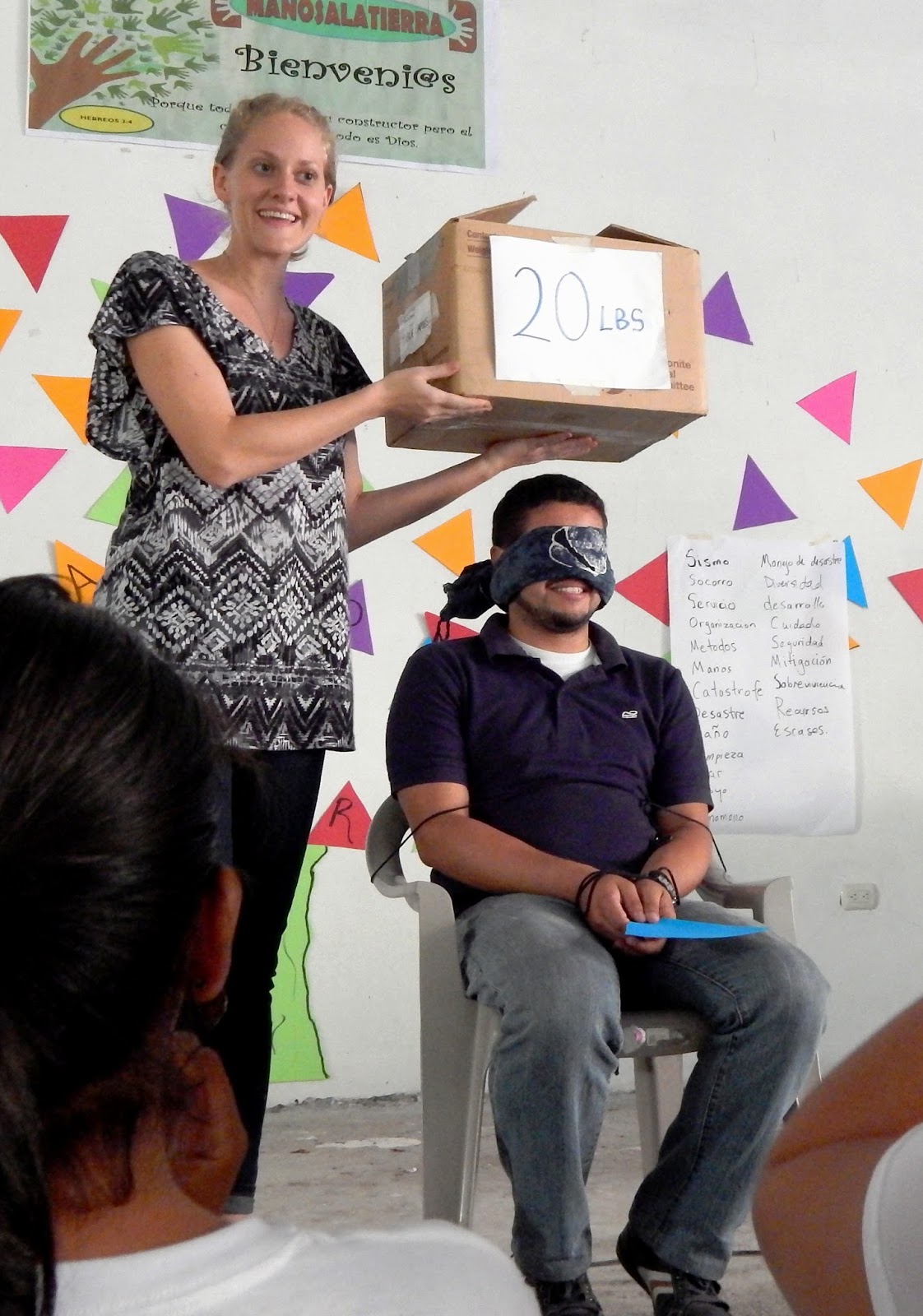Merelin Amaya Ponce and Kenri Cardona work with their group to construct a paper house.
We were proud of the small house we had constructed. With only 10 minutes and scraps of paper, we had worked feverishly to create the most secure dwelling that we could, complete with a multi-colored ceiling of red, blue, green and orange strips, the design was tasteful and fun. We peered around at the work of the other groups (one with tall, fan-bent walls, another that just looked like a pile of crumpled recycling) and we smiled at each other knowingly. We were sure that we had won the contest. The facilitator, MCC Regional Worker, Elizabeth Scambler, gathered us all for a small vocabulary review game as we waited with anticipation to see which of our houses would win the “strength test”. We finished the game and laughing and excited, gathered back around the houses. Elizabeth looked around at the semi-circle of 20 expectant faces, smiling vaguely. Then without warning, wheeled around and jumped, full-committment with both feet on the fanned house. Before we could even be surprised, she proceeded on to the other, and then to ours. In less than a second, ruining the meticulous work that we had all done. Then she turned to us calmly, reading the shock on our faces:
“How do you feel?”
Shouts of “Betrayed!”, “Violated”, “Disappointed”, “Angry!”, “Sad!” rang out through the crowd.
And when they died down into sullen silence, she took a moment of silence and then said: “Remember how this feels. Remember that sometimes the greatest trauma of a disaster is the emotional one. Psychology is sometimes the most neglected and yet takes the greatest hit in a loss.”
There was a communal dawning of understanding. And then people began to share…

MCC Worker Elizabeth Scambler and participant Jhony Pavon demonstrate the risk of disasters when natural phenomenons affect a vulnerable population.
It was a new pilot project in Honduras this year: a service weekend locally for Honduran Mennonite youth with our partner, Comité de Acción Social Menonita in the mountainous region of Copan. 18 young people from many regions of Honduras had been selected by their congregations to come as delegates and learn about “Disaster Preparedness and the Local Church” and serve with their hands, planting peach trees for slope stabilization and food security in the years to come. For urban youth, the novelty of digging in the dirt and growing food was eye-opening to the work involved and built connections between the supermarket and the earth. And the learning about Disaster Preparedness was a practical and helpful topic in a region plagued by floods and hurricanes, droughts and the occasional earthquake.
 Belkin Santos, Merelin Amaya Ponce, Donis Maradiega Hernandez and Darwin Hernandez with their peach tree.
Belkin Santos, Merelin Amaya Ponce, Donis Maradiega Hernandez and Darwin Hernandez with their peach tree.
Donis Maradiega Hernandez said “It just feels so good to plant something that you know will provide for people for many years to come. I’ve never planted trees before. Now I know how much work it is just to begin after digging the huge holes. I never really thought about how much work it was to grow food: it’s always just been from the supermarket.”
At the end of the weekend, we all sat in a circle, thinking back on the previous hours, wondering how so much could have been packed into such a short time, especially when our bus had broken down en route to the retreat center and we had lost 3 hours sitting in the hot sun, waiting for another bus to come. And we went around the circle, sharing something that we had learned, something that we would take with us, some way that we wanted to continue to live out our new learnings.
Darwin Hernandez said “I now see my community through different eyes. I see the risks involved in living where we do (near the river that sometimes overruns its banks), but I also see the resources that we have to mitigate the risks. If we have a plan, we have more hope and organization in the face of a disaster.”

Participant Doris Sabillon pastes ideas on the Risk Management/Disaster Cycle.
Clivia Avila, a Chemistry major at the university said “They don’t teach us this in school. After all my years of university, I now realize how important this is, these are things worth learning. Things that matter for us here in Honduras. Now, I feel like I am empowered to actually do something in the face of a disaster.”
It was a fun and successful weekend of learning and working and growing together.
And in spite of the challenges, “I wish the weekend could have been longer” said Linda Medina, as we waited on our bunk beds in a half-constructed retreat center. The men didn’t have any showers, as they were sleeping in tents, so out of the mercy of our hearts, we women were letting them use ours and were waiting our turn, still with dirt under our manicured fingernails and crusted sweat in our eyebrows.
“I hope this event continues every year,” said Linda, “But not only that, I hope that I can find everyday ways to serve in my own community as well. I have learned lots and I want to share it.”

Most of the group with the workers from CASM Copan after planting peach trees.


